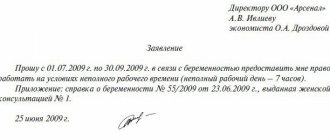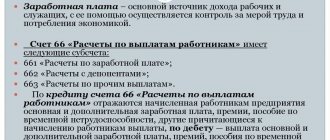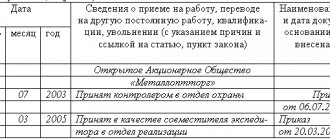Home / Labor Law / Employment / Part-time and part-time work
Back
Published: 08/07/2016
Reading time: 8 min
0
5441
The need to generate additional income forces working citizens to look for additional places to work. In this regard, a completely reasonable question arises: how many jobs can one employee officially get?
When applying for additional employment, the official status of the employee should be taken into account first of all, since only in this case will he have the rights to all social guarantees, payments and benefits (if any are provided for by law for a specific category of working citizens).
- What does the law say?
- How many bets are allowed?
- Payment order
- Rates for teachers and health workers
Part-time work: concept and types
Quite often, an enterprise has employees registered as part-time workers.
Part-time work means that an employee works in one organization in the main position, and at the same/another enterprise performs some regular type of activity in his free time (Article 282 of the Labor Code of the Russian Federation). The key words in this case are “free time” and “regularity”.
Part-time work can be:
- external (main and additional work is performed in different organizations);
- internal (additional work is performed in the same organization as the main one).
Registration of a full-time employee as a part-time employee is often more profitable for the employer than searching for and hiring an applicant (despite the fact that he may refuse this job even after completing his training). Workers also benefit from the institution of part-time work, as it allows them to receive additional income.
The specificity of part-time employment is that the conditions of such work are made dependent on the applicant’s main job for the position. That is, if the applicant does not have a main job, then he cannot be hired for a part-time job.
In Art. 60.1, 66, 68, 282 - 288 of the Labor Code of the Russian Federation do not provide for any restrictions related to the number of registrations for a part-time worker. That is, you can apply for a part-time job as many times as necessary (depending only on desire and strength).
Work time
How many hours per week can you work part-time? Working hours and hours are negotiated between the employee and the employer. There may be some nuances, but the employer cannot create a work schedule so that part-time activities will exceed 4 hours a day and 20 hours a week, as this is the norm. In a typical position, the workweek typically lasts 40 hours. The legislation of the Russian Federation indicates how long additional activities may take. It cannot take a person more than half of this time.
Internal part-time and combination: what is the difference
Very often the concepts of “internal part-time work” and “combination” are confused, considering them synonymous. In fact, these are two different options for designing additional work.
Article 60 of the Labor Code of the Russian Federation prohibits requiring an employee to perform duties not stipulated by his employment contract. Therefore, if an employer requires an employee to expand the range of his duties, perform work in a different profession, or replace a temporarily absent employee, then the legislation provides two options for registering additional work for an already registered employee: part-time or part-time work.
Part-time work represents the full performance of duties by an employee with the mandatory conclusion of an employment contract (Article 60.1 of the Labor Code of the Russian Federation). In this case, additional work is performed regardless of the main duties in the time free from the main job. Part-time work is regulated by Chapter 44 of the Labor Code of the Russian Federation. The procedure for part-time work for teachers and doctors has certain features; it is determined by regulations of the Government of the Russian Federation for each category of these persons.
Part-time employment is issued for vacant positions. After registration, the part-time worker is assigned an independent personnel number. Keeping records of the working hours of a part-time employee and the main position is carried out separately.
If the employer finds another employee for a part-time position, for whom this work will be the main one, then he can fire the part-time employee. This right of the employer is provided for in Art. 288 Labor Code of the Russian Federation. In this case, the part-time partner must be notified 2 weeks before the date of termination of the contract.
Internal combination is the performance by an employee of an organization of additional duties without interruption from his main job. In this case, new work is performed for the same (increase in the volume of work) or related (expansion of responsibilities) position within the framework of one employment contract. For combination, it is not necessary to have vacant positions; it can also be registered for an occupied position (for example, during the absence of the main employee). The possibility of combination must be provided for in a collective agreement or other local act of the organization. on the time sheet .
For greater clarity, let us combine the distinctive features of internal part-time and combination in the table.
Internal part-time work: limitations and features
There are categories of workers for whom part-time work is prohibited by labor legislation. In accordance with Art. 282, 329, 276 of the Labor Code of the Russian Federation it is unacceptable to hire as part-time workers:
- minors;
- persons who work in their main job with harmful (dangerous) working conditions, if part-time work will be carried out in similar conditions;
- employees of state and municipal institutions;
- persons whose main work is related to driving or moving vehicles, if the planned part-time work is similar;
- military personnel (except for such industries as pedagogy, science and creativity, provided that such part-time work will not interfere with the performance of military duties);
- security guards in relation to public service and paid work in public associations;
- judges, lawyers, prosecutors (except for such industries as pedagogy, science and creativity);
- heads of organizations without consent to part-time work from the general meeting of the organization’s participants (board of directors), from the main place of work.
Internal part-time work has a number of features:
- Internal part-time work is in fact additional work performed in free time from the main job in the same organization.
- In case of internal part-time work, a separate employment contract must be concluded between the employee and the employer (Article 282 of the Labor Code of the Russian Federation).
- Since the internal part-time worker has already been registered with this employer, he does not need to provide any documents to conclude an employment contract. An exception is a document confirming the competence of a part-time worker if the new job requires special qualifications.
- It is necessary to indicate in the employment contract and in the hiring order that it is an internal part-time worker who is being hired.
- Full-time internal part-time work is not possible.
- In case of internal part-time work, a separate time sheet is kept for the employee. This allows you to control the number of hours worked and prevent overtime (Article 91 of the Labor Code of the Russian Federation).
- An entry about part-time work in the work book is made at the request of the employee (Article 66 of the Labor Code of the Russian Federation).
Restrictions on internal part-time work
Internal part-time work involves working at the same company in different positions. Registration of such relations involves drawing up another employment contract. It displays the amount of working time, rate, rights and obligations, and monetary remuneration of the employee.
Internal part-time work involves the work of the same person in different positions at different times in the same organization. The duration of the working day cannot be more than 4 hours. Full-time internal part-time work is not possible. Its maximum value is 0.5.
Remuneration for internal part-time workers
Remuneration for internal part-time workers is carried out in accordance with Art. 25 Labor Code of the Russian Federation.
Types of remuneration for internal part-time workers:
- time-based (proportional to working hours);
- piecework (depending on output);
- by agreement of the parties (the conditions are specified in the employment contract).
The guaranteed payment for a part-time worker is fixed in the employment contract, taking into account the wage system at the enterprise (Article 135 of the Labor Code of the Russian Federation). A part-time employee has the right to receive allowances, bonuses and other compensation and incentive payments on a general basis, if such additional payments are provided for by regulations, collective agreements and contracts, and internal regulations of the employer.
Internal part-time work: how many bets are possible under the Labor Code of the Russian Federation
The tariff rate is included in the tariff system for differentiating wages of workers of certain categories (Article 143 of the Labor Code of the Russian Federation).
In practice, normal working hours are 8 hours per day (40 hours per week). This is the length of the working day that corresponds to the full tariff rate. At the same time, Part 1 of Art. 284 of the Labor Code of the Russian Federation establishes a limit on working hours for part-time work - no more than 4 hours a day. Consequently, in proportion, a part-time worker can be hired for no more than 0.5 of the tariff rate.
However, Part 1 of Art. 284 of the Labor Code of the Russian Federation allows that a part-time worker can work full time (shift) if he is free from performing job duties at his main place of work.
So, under standard working conditions, an internal part-time worker can only work at 1.5 times the wage rate (the full rate at the main place of work is 0.5 times the internal part-time rate).
How long can you work part-time?
The Labor Code of the Russian Federation clearly defines the number of working hours both at the main place of work and at the additional one. Based on its provisions, with a part-time job, an employee has the right to work no more than 4 hours a day. Note that this norm applies for each employment contract separately (Article 284 of the Labor Code of the Russian Federation). Consequently, each employer maintains its own records of hours worked within the framework of the concluded employment contract.
To account for labor costs, as well as to fill out some forms of statistical reporting, the employer needs to calculate the man-hour indicator. ConsultantPlus experts explained in detail how to do this correctly. If you do not have access to the K+ system, get a trial online access for free.
A part-time worker can work a full working day when he is not busy at his main place of work. These may be weekends and holidays or days of forced rest (for example, if the employer has delayed payment of wages for 15 days or more or the employee’s health condition does not allow him to perform his job duties).
IMPORTANT! In a month (or other accounting period), a part-time worker must work no more than half of the standard working hours provided for his category.
For part-time workers employed in the fields of education, culture, medicine and pharmaceuticals, the permitted work time depends on their category and can range from 16 hours to the monthly norm (Resolution No. 41).
Documents for internal part-time work and part-time work from the employee
When applying for an internal part-time job, the employee must first write an application. In principle, an application for a part-time job is not very different from the application that an employee writes when applying for a main job.
In case of internal part-time and part-time work, you do not need to present your passport and education documents to the employer again, since they have already been provided to the HR department during employment for the main job.
The only exception in this case is the employment of the main employee for additional work, which requires the presence of other qualifications.
Reflection of the duration of the working day in the employment contract
The number of hours a person must work in an additional job is reflected in the employment contract. You cannot work more than 20 hours a week.
Before the appointment, the working hours must be agreed upon between the employee and the employer. Based on the results, a duty schedule or a special table can be drawn up. The last option is relevant for shift work.
The payment procedure is established individually and is enshrined in the labor language. There are several options here:
- payment of wages for the actual number of hours worked (time-based);
- payment for the amount of work performed (piecework).
Time-based payment is most often used, as it simplifies the procedure for calculating and deducting amounts due.
Similar articles
- Internal part-time and combination, what is the difference?
- External and internal part-time work: differences
- Part-time work: how to register correctly
- Can a part-time worker work full time?
- How to apply for an internal part-time job with one employer
Part-time employment contract
An employment contract with an internal part-time worker is not very different from a standard employment contract. According to the standard, it is made in two copies (one for each side). The main difference is that it must contain the mark “on a part-time basis.”
Also, the contract must separately specify the number of working hours, since in accordance with labor legislation, the number of working hours of a part-time worker must be half less than the working hours of the main job for a calendar month.
In addition, according to the standard, an employment contract must include the following employment conditions:
- rights and obligations of the employee and employer;
- wages and social guarantees;
- working time and rest time;
- liability of the parties to the contract;
- amendment and termination of the employment contract;
- contract time.
An employment contract with an internal part-time employee can be fixed-term or indefinite, depending on the agreements between the parties and the specifics of the work performed.
Salary

There are no special features in this case. A person works a certain number of hours or days and gets paid for it. The only difference is that he works a little less, which is why his earnings may differ slightly. If payment is made not for hours, but for work done, the calculation is based on the amount of work the employee does. For example, if a cleaner has to clean three rooms during her working time, it doesn’t matter whether she did it in an hour or four. In any case, the work is paid in full.
Important! Part-time workers can apply for allowances, rewards and incentives, just like employees of the main job. All this must be regulated by agreement and legislation.
Another important note is that the employee should not receive less than the minimum wage established in the region. This condition only works if the employee has duly worked all the hours assigned to him.
The employer must remember that he is not relieved of his obligations to provide insurance and social benefits if he hires a part-time employee. The same rules apply here as for regular employment. In the event of pregnancy, the obligations begin to apply only when the employee has already worked in his position for more than two years. This is a mandatory period of service.
We should not forget that a person can get sick. In the event that the part-time job is internal, one sick leave is taken, because it needs to be attributed to only one manager, despite two positions. If the part-time job is external, you will need two sick leaves, because they must be submitted to two different companies. Sick leave for additional work is processed in the same way as for the main one.
Can internal part-time work become the main job?
Labor legislation does not provide for a ban on the transition of internal part-time work to the category of the main job. There are two ways to make such a transition:
- The part-time worker is dismissed from the main place of work by order, and an additional agreement on the transition to the main job is drawn up to the part-time employment contract.
- The employee is completely dismissed from both positions and then rehired with a new employment contract.
Results
Thus, part-time and combination are two different concepts. Part-time work is actually a second job, while part-time work is only an additional responsibility to the main job.
Violations in this area entail liability in accordance with Art. 5.27 Code of Administrative Offences. To avoid mistakes in registering these labor relations, it is necessary to take into account their features and register employees only strictly in compliance with all established rules.






